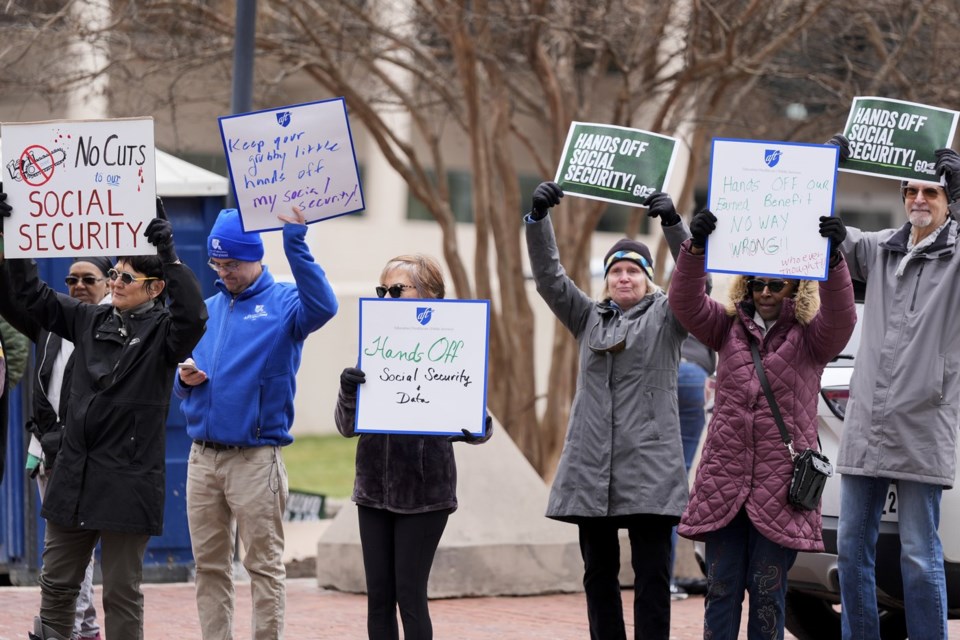BALTIMORE (AP) — A federal judge on Thursday imposed new restrictions on billionaire Elon Musk’s Department of Government Efficiency, limiting its access to Social Security systems that hold personal data on millions of Americans.
U.S. District Judge Ellen Hollander issued a preliminary injunction in the case, which was brought by a group of labor unions and retirees who allege DOGE’s recent actions violate privacy laws and present massive information security risks. Hollander had previously issued a temporary restraining order.
The injunction does allow DOGE staffers to access data that’s been redacted or stripped of anything personally identifiable, if they undergo training and background checks.
Hollander said DOGE and any DOGE-affiliated staffers must purge any of the non-anonymized Social Security data that they have received since Jan. 20. They are also barred from making any changes to the computer code or software used by the Social Security Administration, must remove any software or code they might have already installed, and are forbidden from disclosing any of that code to others.
“The objective to address fraud, waste, mismanagement, and bloat is laudable, and one that the American public presumably applauds and supports,” Hollander wrote in the ruling issued late Thursday night. “Indeed, the taxpayers have every right to expect their government to make sure that their hard earned money is not squandered.”
But that’s not the issue, Hollander said — the issue is with how DOGE wants to do the work.
“For some 90 years, SSA has been guided by the foundational principle of an expectation of privacy with respect to its records. This case exposes a wide fissure in the foundation,” the judge wrote.
During a federal court hearing Tuesday in Baltimore, Hollander repeatedly asked the government’s attorneys why DOGE needs “seemingly unfettered access” to the agency’s troves of sensitive personal information to uncover Social Security fraud.
Union members and retirees gathered outside the courthouse to protest DOGE’s actions, which they consider a threat to the future of Social Security benefits.
“What is it we’re doing that needs all of that information?” Hollander said, questioning whether most of the data could be anonymized, at least in the early stages of analysis.
Attorneys for the Trump administration said changing the process would slow down their efforts.
“While anonymization is possible, it is extremely burdensome,” Justice Department attorney Bradley Humphreys told the court.
He argued the DOGE access doesn’t deviate significantly from normal practices inside the agency, where employees and auditors are routinely allowed to search its databases.
But attorneys for the plaintiffs called it unprecedented and “a sea change” in terms of how the agency handles sensitive information, including medical and mental health records and other data pertaining to children and people with disabilities — “issues that are not only sensitive but might carry a stigma.”
The access alone is a privacy violation that causes harm to Social Security recipients, said Alethea Anne Swift, an attorney with the legal services group Democracy Forward, which is behind the lawsuit.
“That intrusion causes an objectively reasonable unease,” she said.
The Social Security Administration has experienced turmoil since President Donald Trump began his second term. In February, the agency’s acting commissioner Michelle King stepped down from her role after refusing to provide DOGE staffers with the access they wanted.
The White House replaced her with Leland Dudek — who failed to appear at Tuesday’s hearing after Hollander requested his presence to testify about recent efforts involving DOGE. The judge issued a letter last month rebuking Dudek’s threats that he might have to shut down agency operations or suspend payments because of Hollander’s temporary restraining order.
Hollander made clear that her order didn’t apply to SSA workers who aren’t affiliated with or providing information to DOGE, so they can still access any data they use in the course of ordinary work. But DOGE staffers who want access to the anonymized data must first undergo the typical training and background checks required of other Social Security Administration staffers, she said.
In recent weeks, Dudek has faced calls to resign after he issued an order that would have required Maine parents to register their newborns for Social Security numbers at a federal office rather than the hospital. The order was quickly rescinded. But emails showed it was political payback to Maine Gov. Janet Mills, a Democrat who has defied the Trump administration’s push to deny federal funding to the state over transgender athletes.
Despite the fraught political context surrounding the DOGE access case, Hollander admonished Humphreys when he suggested during Tuesday’s hearing that her questioning was starting to “feel like a policy disagreement.”
“I do take offense at your comment because I’m just trying to understand the system,” the judge said during Tuesday's hearing.
Hollander, 75, who was nominated to the federal bench by President Barack Obama, is the latest judge to consider a DOGE-related case.
Many of her inquiries Tuesday focused on whether the Social Security case differs significantly from another Maryland case challenging DOGE’s access to data at three other agencies: the Education Department, the Treasury Department and the Office of Personnel Management. In that case, an appeals court recently blocked a preliminary injunction and cleared the way for DOGE to once again access people’s private data.
Hollander’s injunction could also be appealed to the 4th U.S. Circuit Court of Appeals, which sided with the Trump administration in other cases, including allowing DOGE access to the U.S. Agency for International Development and letting executive orders against diversity, equity and inclusion move forward.
Lea Skene, The Associated Press



